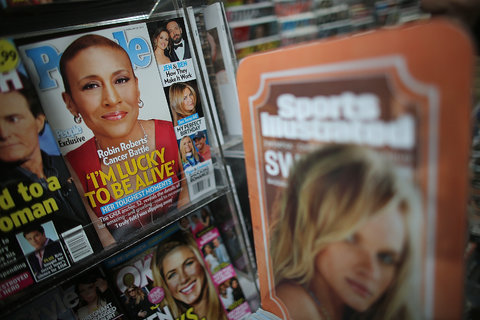The parent company of HBO, CNN, TNT and TBS reported revenue of $6.9 billion in the quarter that ended March 31, down 1 percent from the same period last year. Net income grew 23.5 percent to $720 million, or 75 cents a share, compared with $583 million and 59 cents a share in 2012.
“We’re off to a strong start in 2013, making us even more confident in our full-year outlook,” Jeffrey L. Bewkes, chairman and chief executive of Time Warner, told analysts. He specifically pointed to the success of the company’s cable TV business, driven this quarter by an average nightly audience of 10.7 million for the N.C.A.A. basketball tournament broadcast on several Turner channels.
But Time Warner’s legacy businesses continued to lag. Later this year, the company is expected to complete the spinoff of its Time Inc. publishing unit into a separate, publicly traded company. Revenue at Time Inc., which publishes Time, People, Sports Illustrated and InStyle, fell 5 percent to $737 million, reflecting an 11 percent dip in subscription revenues.
Time Inc. eliminated roughly 6 percent of its total worldwide staff of 8,000 in the first quarter, resulting in $53 million in restructuring and severance charges. “We remain very focused on taking costs out of the business,” said John K. Martin, chief financial and administrative officer at Time Warner. Cost cutting, he added, is “an important step in preparing Time Inc. to function as a stand-alone public company.’’
Revenues at the Warner Brothers studio fell 4 percent to $2.7 billion, while operating income increased by 23 percent to $263 million. “Both ‘Gangster Squad’ and ‘Jack the Giant Slayer’ fell below our expectations,” Mr. Bewkes said.
He remained optimistic about the studio’s slate of upcoming films, including “The Great Gatsby” and “The Hangover Part III.” Warner Brothers had a strong television season with “Revolution,” an apocalyptic drama on NBC, and “Game of Thrones,” the HBO fantasy series that averages 13.4 million viewers per episode.
Mr. Bewkes defended CNN under the leadership of Jeff Zucker, the recently named president of CNN Worldwide. But, he said, the channel still needed to evolve from a trusted source of breaking news to a more regularly watched outlet. “CNN can’t just be politics and wars,” Mr. Bewkes said.
He rebuffed questions about whether the HBO Go on-demand app would be made available on an à la carte basis through a broadband connection, making the premium cable channel more like the streaming service Netflix. “We would do it if we thought it was in our economic best interest,” Mr. Bewkes said. “At this point, we don’t think it makes sense.”
Article source: http://www.nytimes.com/2013/05/02/business/media/time-warner-revenue-is-flat-despite-cable-gains.html?partner=rss&emc=rss

